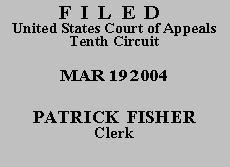

| ANDREW W. MARR, JR.,
Plaintiff-Appellant, and BIOCON INC., Plaintiff, v. HAROLD H. HOLDEN; SCOTT HOLDEN; ENVIRONMENTAL THERMAL SYSTEMS INC.; SAFE-TIRE DISPOSAL CORP., Oklahoma; SAFE-TIRE DISPOSAL CORP., Texas; ABBLE TIRE; RECYCLE ENERGY POWER CORP.; LARRY FENTON; HOLDEN ENERGY CORP.; MELVIN R. ROBINSON; EDDIE CASTILLO; JEAN TOOTHMAN; EUGENE EMBRY; CARTER COUNTY DISTRICT COURT; LOVE COUNTY DISTRICT COURT; GARY HENRY; DENNIS GAY; TOM WALKER; CHARLES ROBERTS; JAMES A. CLARK, as an individual and as an attorney; A-1 MINI STORAGE; JERRY LANDRUM; MARLENE LANDRUM; PHIL STANBECK; JOHN DOE, Sued as John Does 1-15, Defendants-Appellees. |
|
Plaintiff Andrew W. Marr, Jr. appeals from an order of the district court dismissing his complaint for failure to state a claim and as untimely. We affirm.
Mr. Marr designed and patented a thermal reactor prototype device for disposing of medical or other waste. In 1995, a dispute arose between Mr. Marr and defendants Harold and Scott Holden and Environmental Thermal Systems, Inc. Mr. Marr moved the device to a storage unit in Warr Acres, Oklahoma. Thereafter, the device was removed without Mr. Marr's knowledge or consent, allegedly by the Holdens. Mr. Marr filed criminal complaints against the Holdens and Environmental Thermal Systems Inc. alleging they were responsible for the theft of the device. State court litigation ensued over ownership of the device and the legal rights of the parties. The state court actions were settled in June 1997.
In 2003, Mr. Marr filed this suit in federal district court. He alleged defendants had violated his rights under 42 U.S.C. § 1983 and RICO, had infringed on his patent, and had committed felony theft. The district court dismissed the action because the statute of limitations had run on all of Mr. Marr's claims.
On appeal, Mr. Marr contends that his claims have merit. He addresses the statute of limitations issue only as to his patent infringement claim. He asserts that the statute of limitations does not bar that action as the statute runs from the last date of infringement, which is ongoing.
We review the district court's order dismissing an action on statute of limitations grounds de novo, although we will not "disturb the district court's factual findings [supporting that decision] unless they are clearly erroneous." Plaza Speedway Inc. v. United States, 311 F.3d 1262, 1266 (10th Cir. 2002).
Here, all the actions of which Mr. Marr complained occurred prior to June 1997. We agree with the district court that all applicable statute of limitations expired prior to the date he brought suit in 2003. Mr. Marr attempts to avoid the statute of limitations on his patent infringement claim by alleging an ongoing violation. This is a new argument on appeal and we decline to address it. See Bancamerica Commercial Corp. v. Mosher Steel of Kan., Inc., 100 F.3d 792, 798-99 (10th Cir.) (court will not consider a new theory on appeal, even one "that falls under the same general category as an argument presented" to the district court (quotation omitted)), opinion amended, 103 F.3d 80 (10th Cir. 1996). In any event, Mr. Marr misunderstands the continuing violation concept. It does not apply here. Cf. Ward v. Caulk, 650 F.2d 1144, 1147 (9th Cir. 1981) ("[C]ontinuing violation is occasioned by continual unlawful acts, not by continual ill effects from an original violation.").
Upon review of the parties' briefs on appeal, the district court's order and the record, we AFFIRM the judgment of the district court for substantially the reasons stated in its order of May 7, 2003. All pending motions are DENIED.
Entered for the Court
Circuit Judge
*. This order and judgment is not binding precedent, except under the doctrines of law of the case, res judicata, and collateral estoppel. The court generally disfavors the citation of orders and judgments; nevertheless, an order and judgment may be cited under the terms and conditions of 10th Cir. R. 36.3.